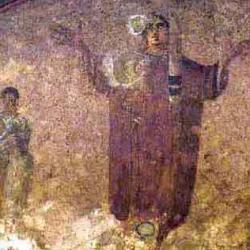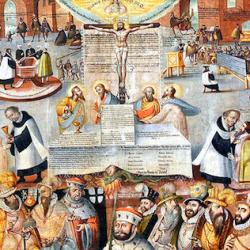Trevor Hart (Between the Image and the Word, 62-74) describes the de-sacramentalizing shift in Barth’s theology. He traces the shift to the work of Barth’s son Markus, who convinced his father that the notion of “sacrament” isn’t a biblical one.
In his later work, Barth argued that the sacraments are not divine actions or mysteries, but simply acts done as a response of faith to the prior act of God: “With all that the community of Jesus Christ and its members are and say and do (Baptism and the Lord’s Supper) belong to something that God has permitted and entrusted and commanded to Christians, namely, the answering, attesting, and proclaiming of the one act and revelation of salvation that has taken place in the one Mediator between God and man, . . . they are actions of human obedience for which Jesus Christ makes his people free and responsible. They refer themselves to God’s own work and word, and they correspond to his grace and commands” (quoted p. 70).
Hart suggests that the problem with Barth’s shift is in his extension from baptism to the Eucharist. Barth thought “one might deduce ‘the sorts of things’ he would have wanted to say about the Eucharist from the things he actually said about baptism,” but Hart find “no reason to make such a lateral move” (72). In fact,”there seems to be no reason why one might not in theory holy quite radically different views of the nature of God’s involvement in Baptism and the Lord’s Supper respectively, especially if one were to begin . . . not with an a priori notion of what a sacrament is, but with the New Testament’s distinctive account of each” (72).
Barth permitted precisely such an a priori role, which is an irony: For it suggests that in rejecting the sacramental tradition of the church, Barth retained one crucial, and problematic feature of that tradition, namely, the tendency to conflate the specific rites of the church and dissolve their different theologies and phenomenologies in a larger category of “sacraments in general.”














